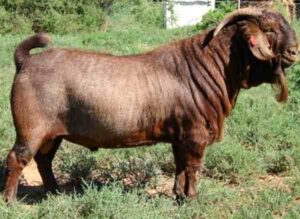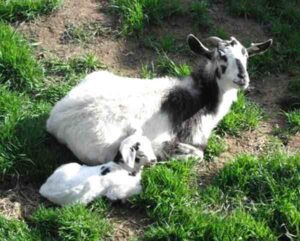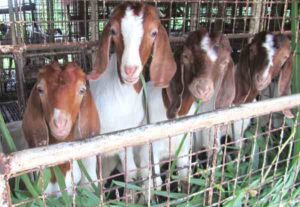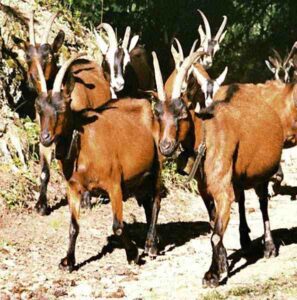The Fainting goat is a breed of domestic goat. It is also known by some other names such as Myotonic goat, Tennessee Fainting, Tennessee Meat, Nervous, Stiff, Texas Wooden Leg, Stiff leg and Scare goats.
The name “Fainting” refer to a breed characteristic known as myotonia congenita, a condition in which the muscle cells experience prolonged contraction when the goat is startled.
Exact origin of this goat breed is unknown. There are two theories about the origin of this breed.
One of the possibilities is that ‘there was a spontaneous mutation of a herd in Tennessee in about 1885, which resulted in the recessive gene’. The other is that ‘a private herd sold around 1880 to a Tennessee farmer was the beginning of the Fainting goat breed.
A man arrived in Marshall County, Tennessee with four goats (a buck and three does), which he had brought from Nova Scotia. The name of that man was John Tinsley. When he moved on a year later, he left his goats behind. It is believed that all the Fainting goats in the United States can trace their origins back to these four goats’.
Fainting goats are one of the few goats that are indigenous to the United States. There are two strains of this goat breed, and most of those are found in Tennessee and less are found in the eastern United States.
Most of the Texas herds tend to be somewhat larger, probably due to selective breeding for the meat market. Fainting goat’s muscles freeze for roughly 3 seconds when the goat feels panic. Though painless, this generally results in the animal collapsing on it’s side.
The characteristic is caused by a hereditary genetic disorder called myotonia congenita. When startled, younger goats will stiffen and fall over. Older goats learn to spread their legs or lean against something when startled, and often they continue to run about in an awkward, stiff-legged shuffle. Read more information about this goat breed below.
Fainting Goat Characteristics
Fainting goat is slightly smaller than the standard goat breeds. Most common coat colors of this breed are black and white, but most possible coat colors (which are found in other goats) are also found in this breed.
The Fainting goats have large, prominent eyes in high sockets. Their hair can either be short or long, with certain individuals producing a great deal of cashmere during colder months. Both bucks and does usually have horns.
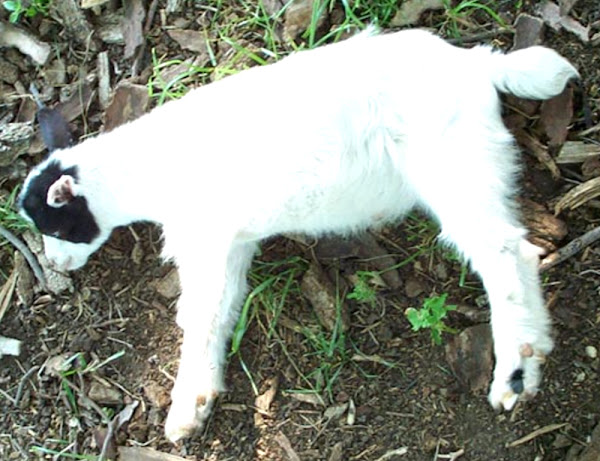
As a smaller sized animal, average height of the Fainting goat is between 17 and 25 inches (43 to 64 cm). And average body weight is between 27 and 79 kg. Photo & info from Wikipedia. Also read causes of fainting in goats.
Uses
The Fainting goat is a meat goat breed. And it is primarily used for meat production. But the breed is also popular for raising as pets mainly because of their unique appearance and characteristics.
Special Considerations
Raising Fainting goat is very easy. They are friendly in nature and usually are of good behavior. They are intelligent, amusing and it’s very easy to care for them. The does are prolific and good mothers, and they like to keep their kids hidden for a few days.
There are no specific season for kidding. And kidding may occur in any time. Most of the Fainting does usually produce twins or triplets. The does have enough milk to raise two or three kids.
Today, the true Fainting goat is pretty rare. And the breed is listed as “rare” by the American Livestock Breed Conservancy. However, review full breed profile of the Fainting goat in the following table.
| Breed Name | Fainting |
| Other Name | The breed is also known by some other names such as Myotonic goat, Tennessee Fainting, Tennessee Meat, Nervous, Stiff, Texas Wooden Leg, Stiff leg and Scare goats. |
| Breed Purpose | Meat, also good for raising as pets |
| Breed Size | Small |
| Bulls | Between 27 and 79 kg |
| Doe | Between 27 and 79 kg |
| Horns | Yes |
| Climate Tolerance | All Climates |
| Coat Color | Many, but most common colors are black and white. |
| Good for Stall Fed | Not Sure |
| Rarity | Rare |
| Country/Place of Origin | United States |


